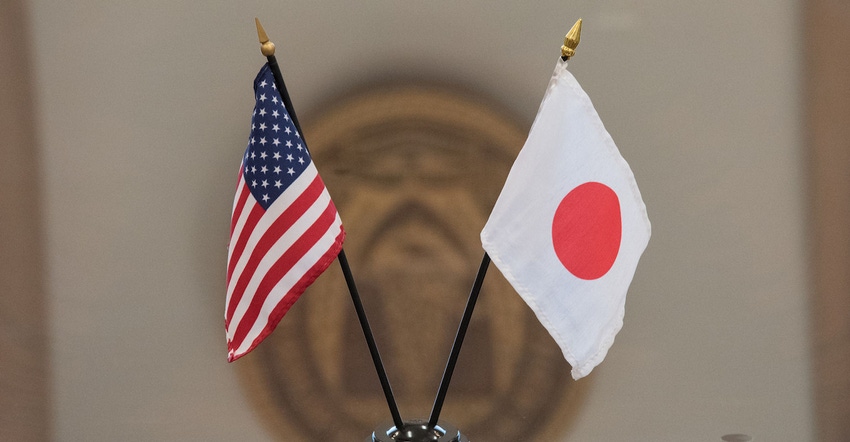Japan agreement sets poor precedent
Exclusions of fresh poultry and dairy products in Japan trade deal could lead future negotiations down similar path.

“We were looking for a win, whether from Japan, China or" the U.S.-Mexico-Canada Agreement (USMCA), Russell Boening, president of the Texas Farm Bureau and owner of Loma Vista Farms and Boening Bros. Dairy, said during a House Ways & Means Committee hearing on November 20.
As the House continues to drag its feet on passage of USMCA and China’s phase 1 deal also looks to be unsettled, the win agriculture so desperately needed this fall came in the form of a quick deal with Japan on specific measures to help bring the U.S. in line with what had already been agreed to under the Trans-Pacific Partnership (TPP).
Darci Vetter, who served as chief agricultural negotiator at the U.S. Trade Representative during the Obama Administration, helped negotiate those line-by-line concessions for agriculture in TPP. Vetter, who now serves as global lead of public affairs and vice chair of agriculture and food at Edelman U.S. Public Affairs, said while the Japan agricultural deal undoubtedly is a positive, it's important to note what is in the agreement and what isn’t.
The short-term gain may create long-term concerns.
It does ensure that the U.S. doesn’t fall behind its competitors -- like Australia and Canada -- that are included in TPP’s successor, the Comprehensive & Progressive Agreement for Trans-Pacific Partnership (CPTPP).
Under this agreement, Japan will eliminate or reduce tariffs on an additional $7.2 billion of U.S. food and agricultural products. More than 90% of U.S. food and agricultural products entering Japan will either be duty free or will receive preferential tariff access once the agreement is implemented. As an example, tariffs for fresh, chilled and frozen beef will be reduced from 38.5% to 9% in 15 years.
However, what was left out of the bill may be what causes the most concern. Key product exclusions include rice, butter, milk powders, lamb/sheep meat, fresh poultry, sugar and sugar-containing products and several horticultural items such as tomatoes, cucumbers, peppers, grapefruits, tangerines, mandarins, pears, grapes, melons and strawberries.
“Given the breadth and depth of U.S. export interests in agriculture, these exclusions are important not only because these products will not gain new market access into Japan but also because future trading partners may see the exclusion of these products as a signal that the United States is willing to exclude products in future deals with the United States,” Vetter said.
She said trade agreements tend to build off of one another, as one sets the precedent for the next. “U.S. agriculture exports a wide variety of products to the world, and having that many exclusions is concerning,” she added.
Vetter said the negotiation process with Japan revealed that agricultural trade is incredibly sensitive, taking into account the role agriculture plays in economies and the employment effect as well as the political power of producers. Who’s to say the European Union or other countries won’t try to do the same?
The response from many agricultural groups after the agreement was cordial -- a sentiment echoed in Boening's testimony before Congress. “It is obvious the U.S.-Japan Trade Agreement is a win; however, the U.S. must pursue the next phase of negotiations with Japan. Not all agricultural products, such as rice and some dairy products, were included in this agreement. We must work toward additional market access. Sanitary, phytosanitary and biotechnology issues should also be addressed,” he said.
Matthew Goodman, senior vice president and senior adviser for Asian economics at the Center for Strategic & International Studies, warned that it likely will be difficult to reach a second-stage agreement with Japan in the near term. “I think Japan is reluctant to move into a full-bore free trade agreement,” Goodman said. “They’ve always been reluctant and are much more inclined to have the U.S. rejoin the CPTPP.”
Yet, when entering the White House, President Donald Trump’s quick action to withdrawal from TPP -- and continued comments on the need for bilateral agreements -- does not offer much optimism on this moving forward.
While the phase-one agreement does not require congressional ratification, a comprehensive second-phase deal will need approval from Congress. With legislators' slow action on USMCA, it’s not a very big surprise that they looked for a quick win to appease agricultural producers begging for a deal, but will the agriculture industry again be forced to pay longer term for choices made in the current trade agenda?
About the Author(s)
You May Also Like





